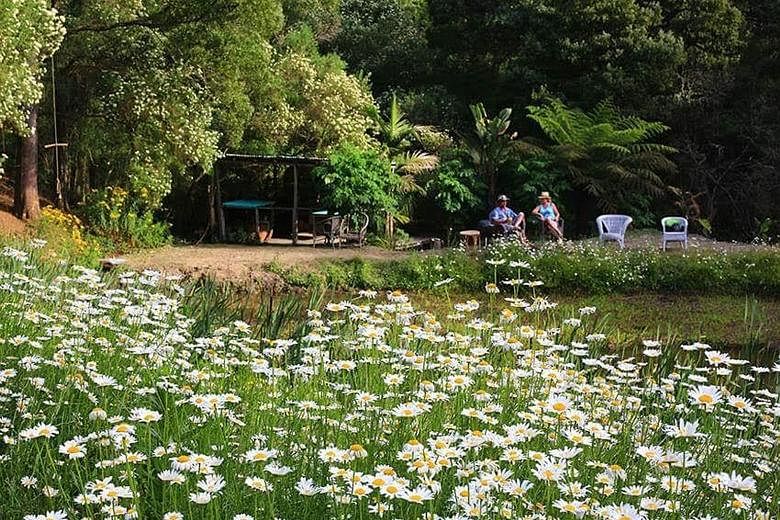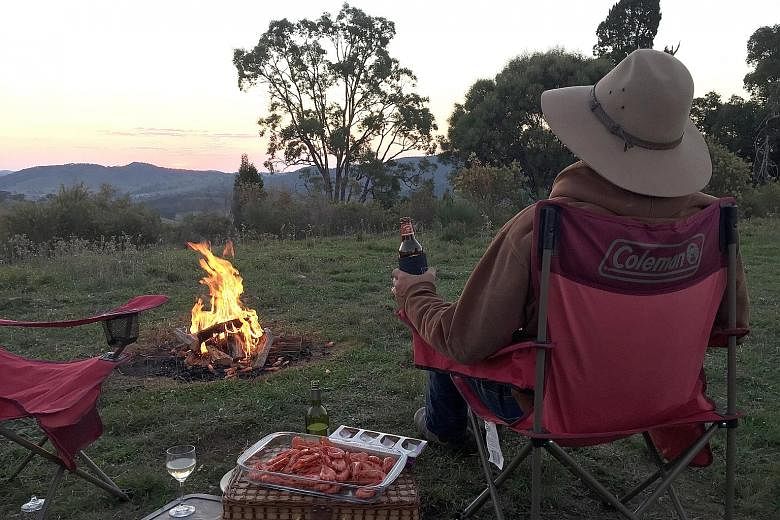It is like Airbnb but without the fresh towels, a bed or actual accommodation.
The latest so-called "disruption" to the travel industry in Australia involves farmers renting out spare bits of their land to holidaymakers.
Various Airbnb-style websites have begun popping up that allow tourists to access Australia's vast - and often empty - rural areas while giving a boost to struggling farmers.
For as little as A$15 (S$16) a night, visitors can camp on the land with tents or camper vans, with private access to as much as 40ha of land.
Other sites provide tiny, remote houses with beds and linen, but without generator power or access to telecommunications.
One of the websites, Youcamp, offers about 5,000 campsites on 400 different properties across the country. It has been growing fast and aims to offer 10,000 campsites on 1,200 properties by next year; and 60,000 campsites on 5,000 properties within five years.
Youcamp co-founder James Woodford came up with the idea with his business partner and former wife Prue Bartlett in 2013 while camping on a property south of Sydney during Christmas.
They noticed that official campsites and caravan parks in the area were all full, even though there were large amounts of unused land available on surrounding farms.
"We were sitting around the campfire and thought - there are all these private properties and they're empty," he told The Sunday Times.
"We thought, there must be a way to connect people who wanted to stay on them."
The site began as a bulletin board in 2013 and was relaunched last December as an Airbnb-style accommodation website.
"We hadn't heard back then of the sharing economy," Mr Woodford said. "We were thinking of a modern equivalent of knocking on a farmer's door and asking to stay by the creek."
Another site, Shacky, allows farmers to offer tiny houses on their properties to holidaymakers.
The wooden houses are for only two people. They come with towels and linen, but have no Wi-Fi and often no phone reception.
For farmers who sign on, Shacky actually builds the houses on the property.
"You can live very stylishly and very comfortably in a tiny home," the head of Shacky, Mr Andrew Hubbard, told the Broadsheet website in June.
"(The farmers) let us use their property, we put the shacks out there, and we provide an additional revenue stream for them.
"As much as it's about providing an escape for people, it's also about helping our farmers."
Shacky plans to have 50 houses by the middle of next year.
Another similar site, Unyoked, installs tiny houses on rural properties. The brothers who founded the site, Cam and Chris Grant, told the Concrete Playground website in March that they wanted to offer people the opportunity to live "off the grid, but without necessarily having to go to Nepal".
"Each property must be secluded, away from the sight or sound of any human-made elements and have wildlife," they said.
For Australia's farmers, many of whom have suffered from drought and fluctuating commodity prices, these sites provide a much-needed source of extra income.
A farmer who listed his 32ha cattle farm in the state of Queensland on Youcamp, Mr Wal Breton, said the accommodation was for campers only and had proven popular.
"It certainly does bring in a little income," he told The Sunshine Coast Daily newspaper in June.
"It is all done above board and you meet everyone that comes in."
The sites are proving increasingly popular with tourists who want to escape the city or find spots that are well away from beaten trails.
But some local governments, concerned about safety, have threatened a crackdown; they want farms offering accommodation to register for approval.
Mr Woodford said the rules for camping often varied depending on the local government and he hoped the federal government would ultimately set national rules.
He said these alternative-Airbnb sites were not just assisting farmers, but were also giving a boost to the nation's tourism industry.
"The amount of space that we have here in Australia is absolutely ridiculous," he said. "People come from places like Singapore or the United Kingdom and they go to the Great Barrier Reef and the Sydney Opera House… (With this) you get to actually meet real Australians… The experiences are very genuine."


